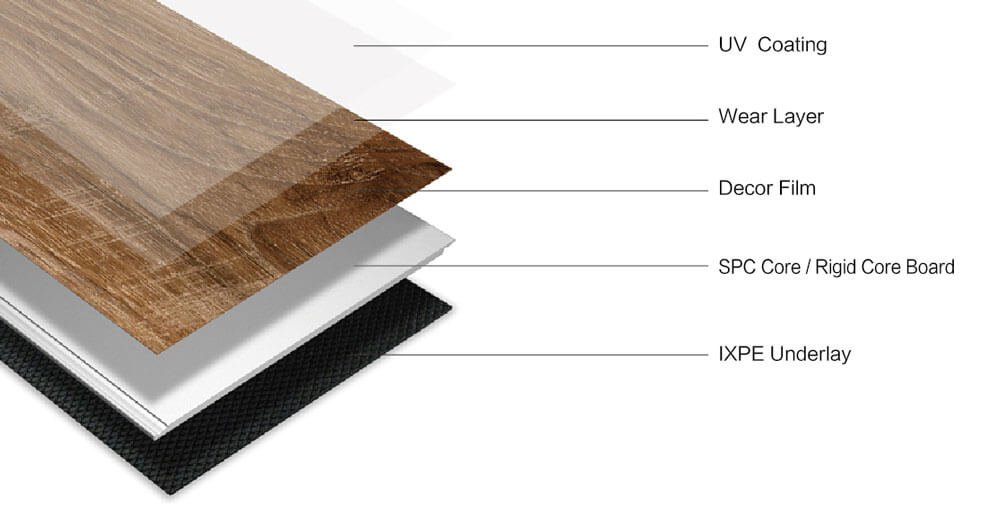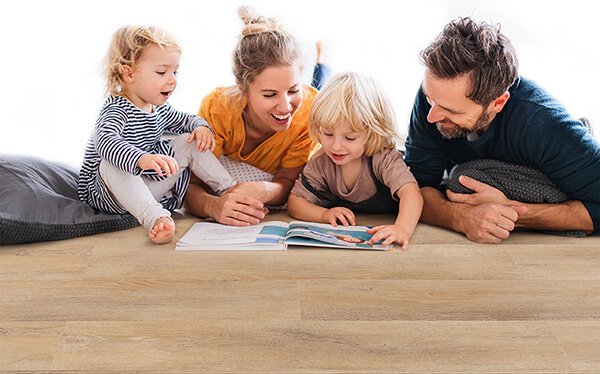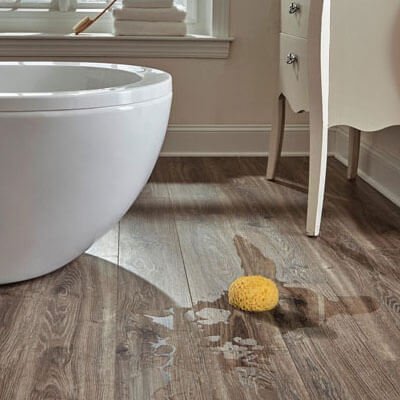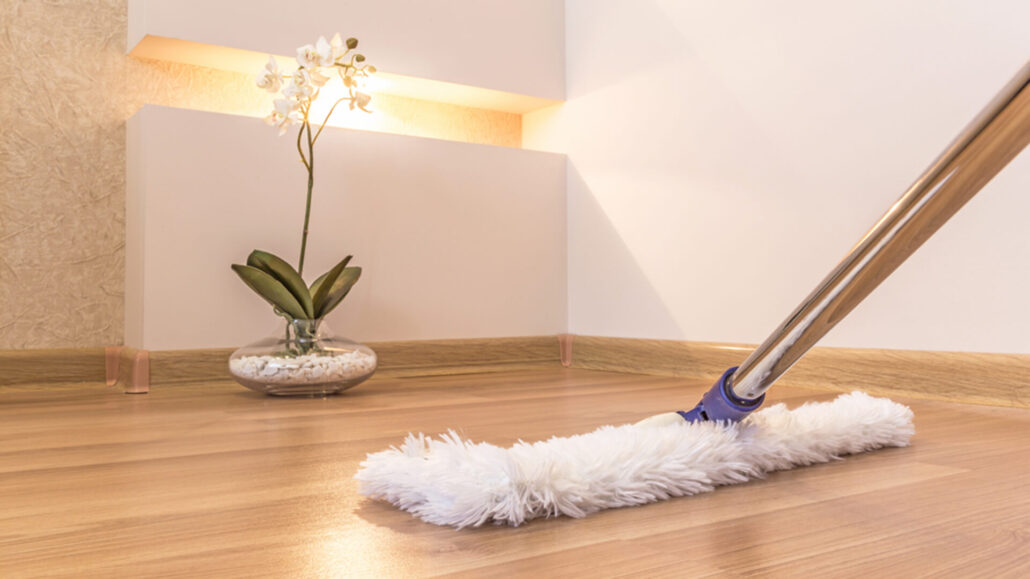Do you want to learn more about SPC flooring and its many benefits? If so, this article is for you! Here we’ll provide an overview of what SPC flooring is and answer some of the most popular questions people ask when it comes to SPC flooring.
What is SPC Flooring?
SPC Flooring stands for Stone Plastic Composite flooring. It is an environmentally friendly floor option made from natural stone powder, polyvinyl chloride, and stabilizers that provide superior durability and performance.

Is SPC Flooring an environmentally friendly option?
Yes, SPC flooring is an environmentally friendly option because it is made from natural stone powder and polyvinyl chloride. It does not contain toxic chemicals or volatile organic compounds.

Is SPC Flooring waterproof?
Yes, SPC flooring is waterproof and highly resistant to water damage. It is designed to withstand spills and moisture, making it an ideal flooring option for bathrooms, kitchens, and other moisture-prone areas.

Can SPC Flooring be installed over existing floors?
Yes, SUNTONE SPC Flooring can be installed directly over most hard surfaces, requiring minimal preparation. This includes concrete, ceramic tile, vinyl, laminate, and hardwood.
Is SPC Flooring a good option for pets?
Yes, SPC flooring is an excellent choice for pet owners because it is highly resistant to scratches and water damage. It also has excellent sound absorption qualities and can help reduce noise levels in your home.

Is it easy to install SPC flooring?
Yes, SPC flooring is relatively easy to install and can be done by most DIY homeowners. It can be easily installed with a click-lock installation system.
Will my furniture leave scratches on my new SPC floors?
It is possible but can be easily avoided with the use of felt pads on furniture legs and feet. This will help reduce the risk of scuffing and scratching on your SPC flooring over time.
Is SPC Flooring a good option for commercial spaces?
Yes, SPC Flooring is an excellent option for residential and commercial spaces. It is highly durable and can withstand heavy foot traffic with proper care and maintenance. It also has excellent sound absorption qualities, making it a great choice for busy, bustling environments.
Does SPC flooring come in planks or tiles?
SPC flooring is usually available in either planks or tiles. Both types of SPC Flooring offer the same benefits and performance, so it’s up to you which type of installation you prefer. Planks are great for creating a seamless look throughout your space, while tiles can provide more design options.
Either way, SPC Flooring is easy to install and maintain, making it a great choice for any home or commercial space.
Does SPC flooring require special maintenance or cleaning?
No, SPC Flooring does not require special maintenance or cleaning. It is designed to be low-maintenance and can be easily cleaned with a damp mop and mild household cleaners.

Are there any special tools required to install SPC flooring?
For DIY installations, you should have most of the tools needed on hand. These include a tape measure, saw, hammer, and chisel or utility knife.
If you’re having the professional installation done, the contractor may bring some specialized tools with them, such as a tapping block, mallet, and pull bar.
It’s always best to check with the manufacturer for specific recommendations before starting any installation project.
Can I install heating systems underneath my SPC floors?
Yes, underfloor heating systems can be installed underneath SPC Flooring. However, checking the manufacturer’s specifications and ensuring the system meets all requirements before installation begins is important.
It is also recommended to use an acoustic underlayment when installing heat-sensitive flooring like SPC to protect the flooring from heat damage.
Additionally, all heating systems must be switched off and tested for accuracy after installation.
Is it difficult to repair damaged areas of an SPC floor?
No, SPC Flooring is relatively easy to repair. Minor scratches and dings can be easily fixed with a light sanding and refinishing of the affected area. You may need to replace the damaged planks or tiles for larger damages.
Following the manufacturer’s instructions for any repair project is important to ensure the best results.
Be sure to also use proper tools and techniques when repairing any type of flooring, as improper methods could damage the floor further.
SPC Flooring is a durable, low-maintenance option that will last for years with proper care and maintenance.
Will my pets ruin my new SPC floors?
No, SPC Flooring is a great choice for pet owners. The durable vinyl material resists scratches and dents from wear and tear, making it a great option for homes with active pets.
It’s important to remember that all flooring needs regular cleaning and maintenance to keep it looking its best. Vacuum or sweep your SPC Flooring regularly to remove dirt and pet hair. You may also want to use a damp mop every once in a while for deeper cleanings.
These simple steps will help keep your SPC Flooring looking beautiful for years.
Does the pattern and color of my SPC floors fade over time?
No, the pattern and color of your SPC Flooring will remain vibrant and true to life over time. The durable vinyl material resists fading in the sun and UV exposure, making it a great choice for rooms with lots of natural light.
You should still avoid exposing your SPC Flooring to harsh chemicals or detergents that could potentially damage the surface. Regular maintenance and cleaning will help keep your floor looking its best for years to come.
Is SPC Flooring suitable for all types of rooms?
Yes, SPC Flooring is a great choice for any room in your home or commercial space. The durable material is waterproof and resistant to wear and tear, making it ideal for high-traffic areas. Additionally, the wide range of styles, colors, and patterns allows you to create an aesthetic that fits your unique style.
Whether you’re looking for a classic wood look or a modern stone finish, SPC Flooring has something to suit every space.
Will humidity or moisture damage my new SPC floors?
No, SPC Flooring is highly resistant to water and moisture damage. When exposed to humidity or dampness, the vinyl material will not swell or warp like other flooring types.
It’s important to remember that standing water can still be damaging to any type of floor. Be sure to dry up any spills quickly, and avoid using excessive amounts of water when cleaning your SPC Flooring.
Following these simple steps will ensure your floor lasts for years to come.
Are there any special cleaners needed for my SPC flooring?
No, SPC Flooring is a low-maintenance option that requires very little in terms of special cleaners. Regular sweeping and damp mopping should be enough to keep your floor looking its best.
Avoid harsh chemicals or detergents on your SPC Flooring as these could potentially damage the surface. You can use a mild soap and warm water solution to clean your floors if needed.
Will sunlight harm my new SPC floors?
No, SPC Flooring is highly resistant to fading and discoloration in the sun. The durable vinyl material will not be affected by UV exposure, making it a great choice for rooms with lots of natural light.
Are there any warranties available for my new SPC Floors?
Yes, most SPC Flooring manufacturers offer a limited warranty on their products. Be sure to check the specific details of your flooring to understand what kind of coverage is included in your warranty. These warranties generally cover manufacturing defects or damage from normal wear and tear. They may also include protection against fading or discoloration caused by UV exposure. Be sure to keep all the paperwork from your purchase if you need to use the warranty.
Can I purchase additional edging strips for my existing SPC Floors?
Yes, SPC Flooring manufacturers typically offer additional edging strips to purchase separately. These are great for making your floor look polished around the edges and doorways. Look for the same flooring style you purchased to ensure a perfect match. With these extra pieces, you can give your SPC Floor a finished and professional look.
Is removing existing SPC Flooring from my home or office easy?
Removing SPC Flooring from your home or office is relatively easy as long as it is installed correctly. With a floating floor installation, you can remove individual planks or tiles without taking up the entire floor. Wear protective gear when removing flooring pieces and dispose of them correctly afterward. Hiring a professional for the job may be best if you’re unsure of the installation method.
Will high heels leave scratches on my new SPC floors?
No, SPC Flooring is highly resistant to scuffs and scratches, making it a great choice for areas with high foot traffic. The durable vinyl material will withstand the pressure from heels without becoming damaged. However, it’s still important to take care when using furniture or appliances on your floors to avoid unnecessary scratches.
Is glue or adhesive required to install SPC flooring?
No, SPC Flooring is a floating floor installation, meaning no glue or adhesive is required. However, ensuring your subfloor is clean and flat is important before laying the planks or tiles down. Use an approved underlayment material for extra cushioning and noise reduction, ensuring it’s flat without seams. This will help keep your SPC Flooring in place and protected from damage.
Is it possible to refinish the existing SPC flooring if I decide to change the color or pattern later on?
No, unfortunately, SPC Flooring is not able to be refinished. The vinyl material is designed for a one-time installation and cannot be sanded or stained like traditional hardwood floors. If you want to change the color or pattern of your SPC Flooring, you’ll need to remove the existing flooring and install new planks.
Is it necessary to wax or polish my new SPC floors after installation?
No, waxing or polishing your SPC floors after installation isn’t necessary. The vinyl material is highly durable and won’t require regular maintenance like other flooring types. You should still clean the floors regularly with an approved cleaner to remove dirt and debris build-up.
Can I lay SPC flooring on ceramic tiles?
Yes, SPC Flooring can be installed over ceramic tiles with the correct preparation. First, check that your subfloor is clean and flat without any chips or cracks in the tiles. You may need to apply a self-leveler to ensure a smooth surface before laying down your SPC Flooring. Additionally, it’s important to ensure the ceramic tiles firmly adhere to your subfloor. If you have any doubts, it’s best to consult a professional before proceeding with the installation.
Are any special tools or materials needed to cut and fit SPC flooring planks?
No, most SPC Flooring planks can be cut with a utility knife.
A table saw is ideal for straight cuts, while a jigsaw can cut curved or intricate shapes. You may also need a tapping block and flooring mallet to fit the pieces together without damaging them.
Is it necessary to use an underlayment when installing over a concrete subfloor?
Yes, an underlayment is recommended when installing SPC Flooring over concrete. Due to a concrete subfloor’s hard and cold surface, adding cushioning for comfort and noise reduction is important. Choose an appropriate underlayment material to protect your floor from moisture damage and help keep your planks or tiles in place.
Can I install a radiant heating system beneath my SPC floors?
Yes, an electric or hydronic radiant heating system can be installed beneath your SPC floors. However, checking with the manufacturer and reading the installation instructions carefully before proceeding is important. The flooring must be properly insulated from any heat source to prevent warping and ensure the longevity of your SPC Floors.
What colors does SPC Flooring come in?
SPC Flooring is available in various colors to match any interior design style, including wood-look, marble-look, carpet-look, and more.
What kind of underlayment should I use for SPC Flooring?
We recommend using an acoustic underlayment for the best performance and sound insulation when installing SPC Flooring. This will provide greater sound absorption and help reduce noise levels in your home.
What type of subfloor must I use for my SPC floor installation?
SPC Flooring can be installed over most existing hard surfaces, including concrete, ceramic tile, vinyl, laminate, and hardwood. The subfloor must be clean, dry, and level before installation begins.
What sealants should I use for my SPC floor installation?
We recommend using a sealant specifically designed for SPC Flooring for the best performance and protection. This will help protect your floor from spills, stains, and water damage over time.
Follow the manufacturer’s instructions before applying sealants or finishes to your new SPC floor. This will help ensure the best results and longer-lasting performance.
What is the best way to install SPC flooring?
The best way to install SPC Flooring is with a floating floor installation. This means the planks or tiles are not attached to the subfloor but rather “float” on top. This type of installation allows you to easily replace any damaged planks or tiles without removing and reinstalling the entire floor.
Follow the manufacturer’s instructions closely when installing your SPC Flooring, and use proper tools and techniques for the best results. With a little care and maintenance, your new SPC Flooring will look beautiful for years.
What transition pieces should I use when joining two different types of flooring surfaces with an SPC floor?
When joining two different flooring surfaces, you should use transition pieces specifically designed for this purpose. These transition strips help create a smooth and even surface between the two types of flooring and protect them from damage. Look for vinyl transition pieces matching your SPC Flooring color and finish to create a seamless look.
What are the benefits of SPC Flooring over traditional hardwood floors?
SPC Flooring has many advantages over traditional hardwood flooring, including its affordability and durability. It is also more resistant to water damage, scratches, and dents than wood, making it a great choice for high-traffic areas. It also has a realistic look and feels, with various textures and colors to choose from that can easily be customized to suit your decorating needs. It installs quickly, making it an ideal choice for renovating any space.
What is the recommended temperature range for installing an SPC Floor?
The ideal temperature range for installing an SPC Floor is between 65 and 80 degrees Fahrenheit. If the temperatures are too high or low, the planks can be difficult to fit correctly and may warp over time. It’s also important to keep the area well-ventilated and maintain a consistent humidity level when installing your SPC floor. Taking these precautions will ensure your flooring lasts for many years to come.
What types of textures are available with an SPC Floor?
SPC Flooring has a wide range of textures, from woodgrain and stone-look finishes to more modern tile looks. Depending on the manufacturer, you may also be able to find unique abstract patterns with subtle details. With its realistic visuals and textured surface, SPC Flooring can bring an elegant feel to any space. You can choose from different textures to achieve your desired look and give your home or office a stylish makeover.
How long does SPC Flooring last?
SPC Flooring is designed to last for years with proper care and maintenance. It is highly resistant to wear and tear, which means it can withstand heavy foot traffic and everyday wear and tear.
SUNTONE SPC flooring is designed to last 30+ years for residential and 15+ years for commercial.
How durable is SPC flooring?
SPC Flooring is incredibly durable and resistant to water, dents, scratches, and stains. It is also highly resistant to wear and tear and can withstand heavy foot traffic for years with proper care and maintenance.
SUNTONE SPC flooring is designed to last 30+ years for residential and 15+ years for commercial.
How does SPC Flooring compare to other types of flooring?
SPC Flooring outperforms other types of flooring in terms of durability and performance. It is highly resistant to wear and tear, water, dents, scratches, and stains. It also has excellent sound absorption qualities and can be installed with a floating.
How do I care for my SPC floor?
To maintain the longevity of your SPC flooring, we recommend vacuuming or sweeping to remove dirt and dust regularly. You can also use a damp mop with mild household cleaners for deeper cleaning.
Use a clean cloth to blot up any excess liquid for spills or sticky substances. Avoid using abrasive detergents, as these may cause damage to your SPC flooring over time.
Finally, protect your flooring from furniture and other heavy items by placing felt pads under the legs or feet to reduce scuffing and scratches.
How long does it take to install SPC Flooring?
The installation time for SPC Flooring depends on the room’s size and the layout’s complexity. On average, most DIY homeowners can expect to spend about 4 hours installing a standard-sized room (200-300 sq. ft). Professional installation may take a bit longer, depending on the job.
How much does SPC flooring cost on average?
The cost of SPC Flooring varies depending on your chosen size and style. On average, most homeowners can expect to spend between $2-$5 per square foot for SPC Flooring. Professional installation will also add to the overall cost.
It’s important to remember that SPC Flooring is an investment in your home and will provide years of beauty, comfort, and durability.
How thick is an average piece of SPC Flooring?
The average thickness of an SPC Flooring plank or tile is around 4~6mm. This is slightly thicker than other types of vinyl flooring and makes it a highly durable option for any space. The extra thickness adds to the cushioning properties, making it comfortable underfoot. SPC Flooring is a great choice for any home or office with its waterproof and wear-resistant qualities and wide range of designs.
How much expansion should be allowed between two pieces of an installed SPC Floor?
For most SPC Flooring installations, you should allow up to a 1/4-inch expansion gap between two pieces. This ensures the planks or tiles can expand and contract naturally in different temperatures and humidity levels without warping or buckling. Transition strips can help cover any visible gaps and create a smoother surface between the pieces.
Overall, SPC flooring is an attractive and cost-effective option for any home. Its advantages over traditional hardwood floors include durability, water damage, and scratch resistance, a realistic look and feel, easy installation, and low maintenance requirements.
This post has provided a comprehensive overview of SPC flooring, making it easy to understand its benefits and installation guidelines. Use SPC Flooring for your next project and enjoy beautiful, long-lasting results.
If you have more questions or need more information, please feel free to contact our experts at SUNTONE Flooring. We’re here to help make your flooring dreams come true!




